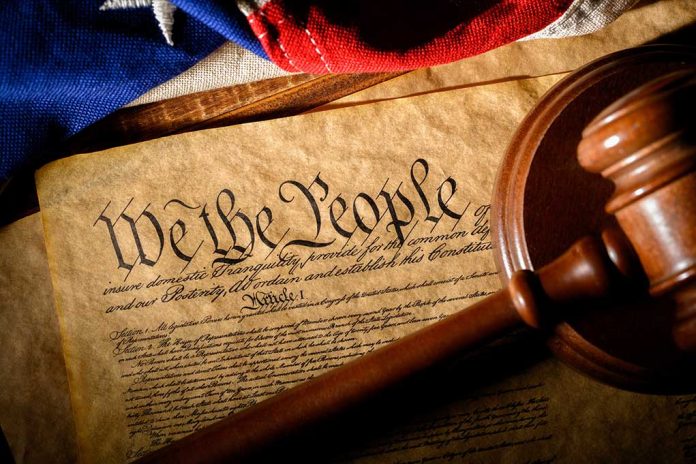
The Supreme Court delivers a knockout punch to government overreach as recent judicial decisions in Wisconsin and North Dakota secure religious freedom for Catholic organizations against federal mandates to fund activities that violate their core beliefs.
Key Takeaways
- The Supreme Court unanimously ruled that Catholic Charities in Wisconsin can opt out of the state unemployment compensation program, reversing a state Supreme Court decision.
- U.S. District Judge Peter Welte protected Catholic healthcare providers in North Dakota from being forced to fund gender-transition procedures against their religious beliefs.
- Justice Sonia Sotomayor emphasized that the government must maintain neutrality between religions and cannot make distinctions based on theological practices.
- These rulings reflect President Trump’s ongoing commitment to religious liberty protections and could have far-reaching impacts on similar cases nationwide.
Supreme Court Unanimously Backs Catholic Charities
In a significant victory for religious liberty, the Supreme Court unanimously ruled that a Catholic Charities chapter in northern Wisconsin can opt out of the state’s unemployment compensation program. The decision, penned by Justice Sonia Sotomayor, reversed a Wisconsin Supreme Court ruling that had denied the organization a religious exemption based on the fact that it served people of all faiths, employed non-Catholics, and did not actively proselytize. The high court found this distinction between religious practices fundamentally violated constitutional protections.
“It is fundamental to our constitutional order that the government maintain ‘neutrality between religion and religion,'” wrote Justice Sonia Sotomayor. “There may be hard calls to make in policing that rule, but this is not one. When the government distinguishes among religions based on theological differences in their provision of services, it imposes a denominational preference that must satisfy the highest level of judicial scrutiny.”
Wisconsin’s Failed Religious Test
The case began when Catholic Charities sought to join a less expensive alternative church system instead of remaining in Wisconsin’s state unemployment program, which it had participated in for over 50 years. Wisconsin officials denied the exemption, arguing the charity’s work was not sufficiently religious. In doing so, the state effectively created a religious test that favored denominations that require proselytization or exclusive service to their faith members – a clear constitutional violation according to the justices.
The impact of this decision could be far-reaching, potentially affecting similar unemployment compensation programs in 46 other states. Justice Clarence Thomas wrote a concurring opinion citing unconstitutional religious discrimination under the “church authority doctrine,” while Justice Ketanji Brown Jackson also concurred, noting the Wisconsin Supreme Court’s decision violated the neutrality principle required by the Constitution’s Religion Clauses.
North Dakota Victory Against Gender Transition Mandates
In a parallel victory for religious liberty, U.S. District Judge Peter Welte ruled that federal agencies cannot require Catholic healthcare providers to fund gender-transition procedures if doing so violates their religious beliefs. The case was brought by the Catholic Benefits Association, an order of Catholic nuns, and two Catholic care facilities challenging the Biden administration’s interpretation of the Affordable Care Act that would have forced them to provide coverage for procedures contrary to their faith.
“The case-by-case exemption procedure leaves religious organizations unable to predict their legal exposure without furthering any compelling antidiscrimination interests,” wrote Welte.
Judge Welte’s ruling specifically barred the U.S. Equal Employment Opportunity Commission from mandating health plans that cover “gender-affirming care” for religious organizations. The decision aligns with President Trump’s executive order signed in 2025 recognizing only male and female biological sex, further strengthening protections for faith-based organizations against progressive ideology that conflicts with their religious teachings.
The Broader Religious Liberty Renaissance
These two significant rulings represent part of a larger trend of courts recognizing and reinforcing religious liberty protections against government overreach. The Supreme Court has recently favored religious plaintiffs in several cases, indicating a judicial commitment to the First Amendment’s guarantee of religious freedom. This pattern suggests religious organizations may find increasing legal support when facing mandates that would force them to violate their sincerely held beliefs.
While Judge Welte dismissed the plaintiffs’ motion regarding abortion and fertility treatment issues due to underdeveloped arguments, the victory on gender transition funding establishes an important precedent for religious healthcare providers. The decision recognizes that faith-based organizations cannot be compelled by the government to participate in services or fund procedures that fundamentally contradict their religious doctrine, particularly when alternative providers exist for patients seeking such services.



